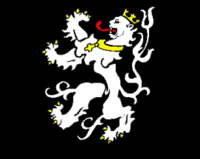Ghent
 From Conservapedia
From Conservapedia | Ghent | |
|---|---|
|
| |
| Country | Belgium |
| Region | Flanders |
| Population | 257,029 |
| Area (sq mi) | 60,3 |
| Population density (/sq mi) | 4,300 |
| Current mayor | Daniël Termont |
Ghent (Dutch: Gent, French: Gand, Spanish: Gante, Gaunt in Medieval English) is a city on the confluence of the rivers Scheldt and Leie, in the Flanders region of Belgium (capital of Flanders). It enjoyed extreme prosperity in the Middle Ages and early modern period as a centre of cloth production. The decline of this industry ended the town's growth, but helped preserve its remarkable collection of historical buildings. Today Ghent is a popular tourist centre. Ghent has a population of 257,029 (2016).
History[edit]
Ghent was the birthplace of John of Gaunt (1340-1399), the third surviving son of Edward III of England, and father of Edward IV.
The city is also the birthplace of Charles V (1500–1558), Holy Roman Emperor.
The Treaty of Ghent, that ended the War between the United States and the United Kingdom in 1812 was signed in the city of Ghent. For this reason there are a few towns in the United States named Ghent.
Ghent was home to the 1913 Worlds Fair and the Gent-Sint-Pieters Railway Station, the former post office and the St. Michael's Bridge where build for the occasion. [1]
Historic buildings[edit]
- Belfry
- Gravensteen
- Saint Bavo Cathedral
- Saint-Nicolas church
- Saint Michaels church
- Saint Michaels bridge
Sport[edit]
K.A.A. Gent - The stadium of the club, Ghelamco Arena (or Arteveldestadion), is a 20,000 seater stadium build in 2013 and is the most modern in Belgium. [2]
See also[edit]
- Flemish School of Painting
- Jan van Eyck (the Adoration of the Lamb)
References[edit]
External links[edit]
Categories: [Belgian Cities and Towns] [Urban History] [Flemish History] [Ghent]
↧ Download as ZWI file | Last modified: 02/26/2023 09:50:21 | 141 views
☰ Source: https://www.conservapedia.com/Ghent | License: CC BY-SA 3.0
 ZWI signed:
ZWI signed:
 KSF
KSF